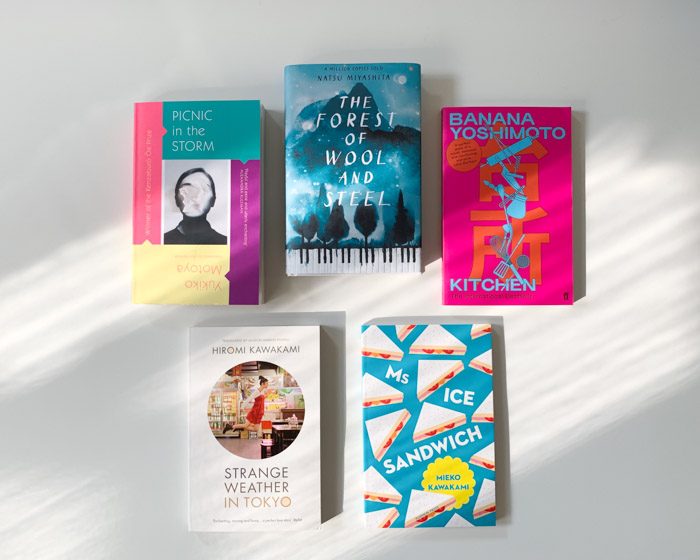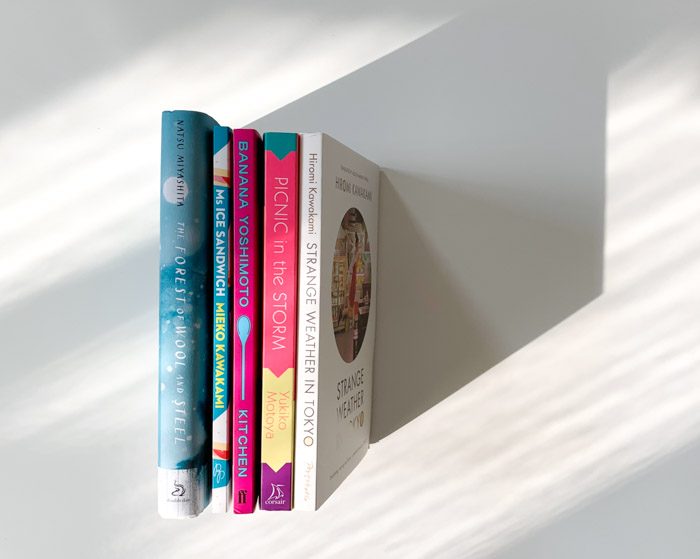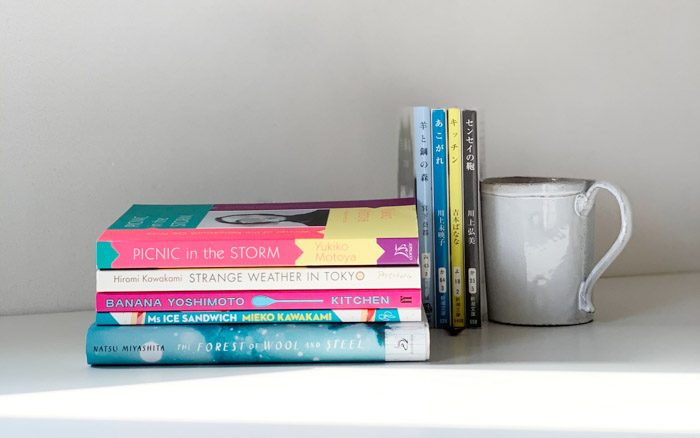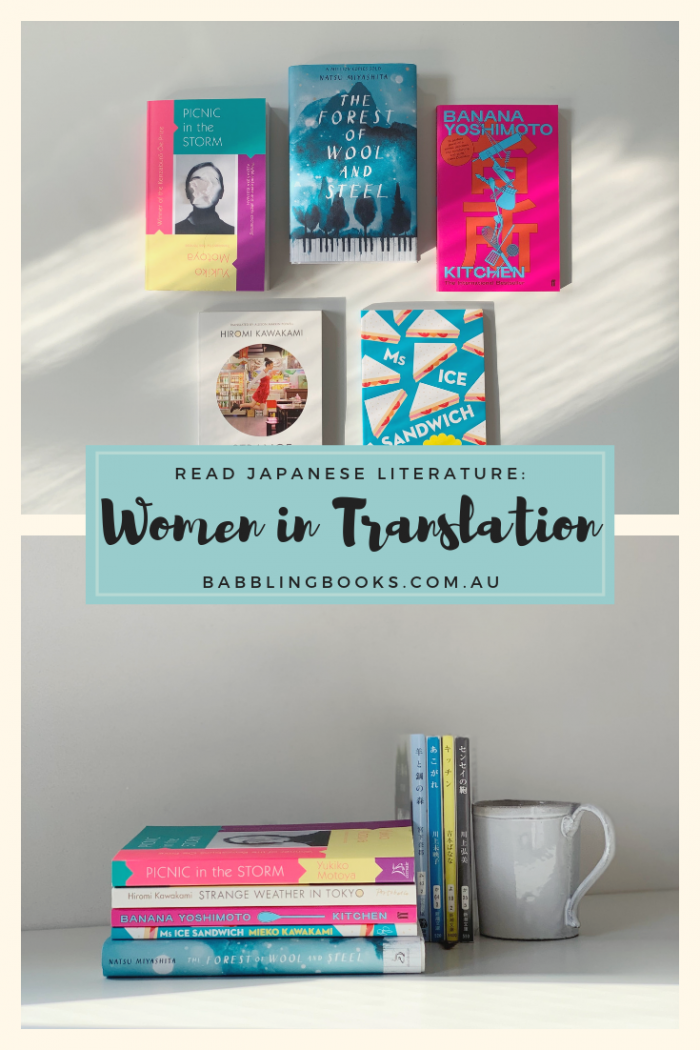Want to read books by Japanese women in translation but not sure where to start? I’m delighted to share a guest blog post from Yuki Tejima that will point you towards five of the most outstanding contemporary women writers in Japan. I met Yuki via her gorgeous Instagram account @booknerdtokyo where her passion for reading, and literature by Japanese women in particular shines through. This post is part of my Women in Translation month series, you can find my first post here.
—————–

Thank you Tamsien for the invitation to share five of my favorite Japanese authors for Women in Translation Month!
To a first-time visitor to Japan, the Japanese may appear to communicate via mystic powers of some sort, sending textured messages back-and-forth without uttering a word. Their expressions give little away, but a closer look can reveal a flood of emotions traveling through space.
Growing up in a Japanese household in the US and having lived in Tokyo for five years, however, I’m no expert in ‘reading’ these emotions. Not yet. When I feel lost (which is often), I turn to the country’s literature for clues into the Japanese mind and heart. Time and again, Japanese authors – many of them women – have helped me understand the complex inner fire that exists beneath the layers.
And while translation may not be able to capture every nuance of the original language, it’s the next best thing to sitting in a Tokyo bar and eavesdropping on regulars as they chat with the owner about love, loss and everything in between.
From new-in-translation authors to household names in the literary world, I hope you find an author that just somehow gets you, and you them.
1. Natsu Miyashita
Her name is not yet known to many in the English-speaking world, but Natsu Miyashita is one of Japan’s most popular contemporary novelists and the writer of over forty novels, essays and short stories. There was no way to introduce her to the wider world until this spring, when her mega-bestseller The Forest of Wool and Steel was published in translation.
The serene, almost meditative novel sat so quietly in the bookstore, I walked past it several times before I realized it was the novel that sold a million copies in Japan, won the influential Japan Booksellers’ Award in 2016, and was turned into a big-budget movie in 2018. (I have the Japanese version on my bookshelf.)
In writing about a young piano tuner on a quest to find meaning in his work and life, the 52-year-old author says her intent was not to provide lessons in self-discovery. Searching for wisdom as she wrote through the fear and uncertainty of her 17-year-old protagonist, she didn’t expect the quiet tale about a young man from the majestic mountains of Hokkaido to strike a chord (no pun intended) with readers. The novel is a layered discovery of craftsmanship (a theme cherished in Japanese culture), what to do with a calling once you’ve found it, and the achievement of “self” in a world where only few can “make a life.”
Miyashita is a writer whose novels I turn to like a warm latte on a cold, rainy day. Prepared with care, providing much-needed comfort, and eventually helping me muster the energy to walk back out into the rain.
Start here:
- The Forest of Wool and Steel (Translated by Philip Gabriel, esteemed translator of many Haruki Murakami works)
2. Banana Yoshimoto
Banana Yoshimoto is perhaps one of Japan’s most well-known contemporary authors, as she has been translated for 26 years, starting with her smash-hit debut novel Kitchen. What is lesser-known is how the typhoon of attention surrounding her debut threw her life into a tail-spin. Author Elizabeth Gilbert speaks of Eat, Pray, Love becoming a worldwide blockbuster and wondering “how in the world I was ever going to write a book again that would ever please anybody.” Yoshimoto knows the feeling.
Now in 2019, we know she settled in nicely, releasing over 75 novels and essays (in Japanese) over two-plus decades. Writing often of loss and healing, emphasis is more on how the broken heart heals, one small insight at a time, than on the traumatic event itself.
In the middle of a dark, sleepless night, she’s the one who can calm a frayed soul, not with all-knowing advice, but with the understanding that your problems are complicated and you don’t need to solve them all tonight. She’ll be there to help until you do. In fact, Yoshimoto might have single-handedly gotten me through my early to late 20s when she gave words to the pain that engulfed me.
Her novels may require the reader to be in a certain mood, as the gentle pacing and subtle revelations can feel slow-moving (and offbeat at times) when what you want is action. But they’ll be waiting when you’re ready to pause, and let out that deep breath you’ve been holding.
Start here:
- Kitchen (Translated by Megan Backus)
- Asleep (Translated by Michael Emmerich)
- Moshi Moshi (Translated by Asa Yoneda)
- Lizard (Translated by Ann Sherif)

3. Mieko Kawakami
One of two famous Kawakamis in the literary world, Mieko Kawakami is hailed by Haruki Murakami as one of Japan’s best young novelists. She debuted as a writer in 2006, nabbing two straight nominations for the prestigious Akutagawa Prize, winning with her second work that earned high praise from acclaimed author Yoko Ogawa (The Housekeeper and the Professor). She is indeed, a writer’s writer.
She is also one of the most vocal female voices in today’s Japanese literary scene, speaking up about gender roles, freedom of expression, and the female body. When she edited the “Women’s Edition” of the prestigious literary magazine Waseda Bungaku last fall, copies flew off the shelves and could not be found anywhere for weeks.
A former singer-songwriter, Kawakami’s stylish, poetic prose sits at the forefront of a much-needed feminist movement, a confident voice Japanese women are happy to stand with.
Her only English-translated novel at the moment is the charming Ms Ice Sandwich, the tip of a razor-sharp iceberg. Some of her writing has been translated and published on Granta and can be read below. Her Akutagawa Prize-winning Breasts and Eggs (yes!) will be available in English in April 2020.
Start here:
- Ms Ice Sandwich (Translated by Louise Heal Kawai)
Granta Articles:
4. Hiromi Kawakami
When I think of Hiromi Kawakami’s works, I think of the word kyorikan, meaning a “sense of distance”. Distance, as in the distance between you and me. Between family members, lovers, friends, co-workers, people sharing a society. That many of her novels take place in Tokyo – packed with human relationships – is probably not a coincidence.
The sight of Tokyo residents smashed up against each other on rush hour trains can frighten any visitor, but when it comes to who they want to really let near, they’re careful and choosy. Earn a place in their hearts and they will defend you for life, but don’t expect a single hug to symbolize immediate best friendship.
Kawakami has a way of illuminating the space that exists between people in nuances so detailed and familiar, you wonder how and when she observed you in your day-to-day life. The characters in her novels are often ordinary people with delightful, awkward eccentricities that in fact, the Japanese have a great affection for.
Quirky is a word often used to describe Hiromi Kawakami’s writing, but her characters are just being themselves. And in doing so, they allow readers to free their unabashed selves.
Start here:
- Strange Weather in Tokyo (Translated by Allison Markin Powell)
Published as The Briefcase in some US editions

5. Yukiko Motoya
Another iconic voice in the contemporary Japanese literary world is Yukiko Motoya, a novelist, playwright, theater director, and performer. Her Akutagawa Prize-winning writing portrays the modern disconnect between people in strange, unsettling, charming ways, opening doors for people to express themselves more honestly and less politely (if polite is what’s expected.)
Motoya begins writing without a set story in mind, because she says, “the novel has to take me somewhere I’ve never been or else I get bored.”
The new Picnic in the Storm (also known in the US as The Lonesome Bodybuilder) is a parade of short stories featuring characters who are less than deft at intimacy. Not all Japanese people are this way, of course. Some are the smoothest communicators you will ever encounter. But Motoya gives the intimacy-averse solid standing in society.
The stories deviate wildly from the shy, quiet Japanese persona, liberating both the reader and a society expected to behave a certain way. Weirdness is normal, and “what’s normal anyway?” is her question. Motoya believes her role as a writer is to acknowledge the “something odd, something weird” in the air, leaving clear-cut explanations to other, more “qualified” authors.
Start here:
- Picnic in the Storm (Translated by Asa Yoneda)
This post is part of my Women in Translation month series, you can find my first post here.
—————–
Pin me for later…


Thank you so much for these awesome recommendations Yuki!
I had never heard of Mieko Kawakami before, but now I’m intrigued to read her work 🙂
Thanks for this list! Banana Yoshimoto is actually one of the first Japanese authors I read, first in English and later in Japanese. “Kitchen” was an easy read and a great book.
Once I got reasonably fluent in Japanese I realized that there is so much great literature out there that deserves to be translated to English. So I decided on being a small-time (self) publisher and I do all the translations myself.
My most recent work was by Hayashi Fumiko, an important woman author from the early 20th century. I really enjoy how she depicts her character’s emotions, and the realistic situations she puts them in.
Anyway, if you are looking to check out a set of her short stories, you can find it here:
https://www.amazon.com/Downfall-Other-Stories-Hayashi-Fumiko-ebook/dp/B086JYB2CW/ref=sr_1_1